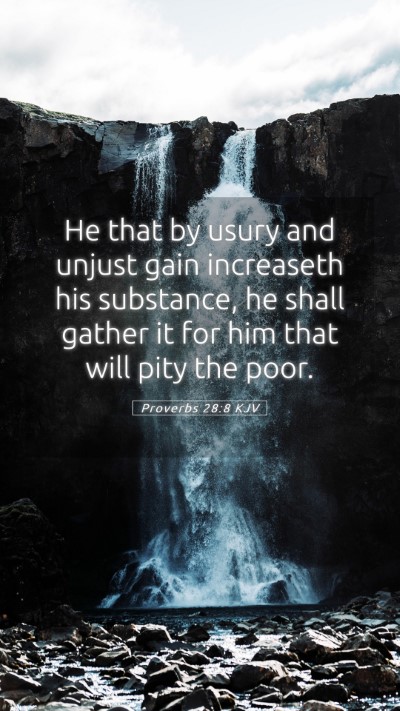Understanding Proverbs 28:8
Proverbs 28:8 states: "He who increases his wealth by exorbitant interest gathers it for him who is kind to the poor." This verse offers potent wisdom on the consequences of unethical financial practices and the fate of wealth acquired through dishonest means.
Insights from Public Domain Commentaries
The interpretations provided by notable commentators such as Matthew Henry, Albert Barnes, and Adam Clarke elucidate the depth of meaning contained within this verse.
Matthew Henry's Commentary
Henry emphasizes the severity of gaining wealth through oppression or unjust practices. He suggests that such wealth will eventually be turned over to the righteous or those who are benevolent toward the poor. Henry's insight indicates that God exercises sovereignty over financial matters, ensuring that greed does not go unpunished.
Albert Barnes' Commentary
Barnes highlights the moral implications of accumulating wealth through usury or exploitation. He argues that although it might seem lucrative in the moment, this wealth does not bring true happiness or security, as it is destined to benefit those who act with charity and generosity. This suggests a divine justice where the riches of the unjust are ultimately redirected.
Adam Clarke's Commentary
Clarke places emphasis on the wisdom found in this proverb, remarking on the way that unscrupulous financial practices lead to a cycle of moral decay. He brings attention to the social ramifications and the call for ethical behavior in financial dealings, which aligns wealth with one's character and righteousness. Clarke’s perspective echoes a call for integrity in all transactions.
Key Themes and Analysis
- The Danger of Exploitation: The verse warns against gaining wealth through unfair practices, highlighting a moral standard that governs all financial dealings.
- Divine Justice: It reflects a larger biblical principle of justice and redistribution, implying that ill-gotten gains will not last and will benefit the righteous.
- Social Responsibility: It calls for a societal recognition of our obligations to the poor and emphasizes kindness as a virtue in acquiring wealth.
Application in Life
For those engaged in bible study groups or online bible study, Proverbs 28:8 serves as a vital instrument for understanding the consequences of financial decisions. It leads to discussions on how to apply ethical standards in personal finances and the significance of generosity.
Related Bible Cross References
- Proverbs 22:16: "He who oppresses the poor to increase his wealth, and he who gives to the rich — both come to poverty."
- Deuteronomy 24:14: "You shall not oppress a hired servant who is poor and needy."
- Luke 6:38: "Give, and it will be given to you, good measure, pressed down, shaken together, running over, will be put into your lap."
Conclusion
This verse encapsulates the importance of ethical conduct in all financial matters, suggesting profound implications for those seeking bible verse meanings, bible verse interpretations, and overall bible verse explanations. It calls for reflection on one's actions and their alignment with divine principles of justice and charity in the accumulation of wealth.
Incorporating the teachings from Proverbs 28:8 into everyday life is essential for aligning one's financial dealings with biblical values, thus enriching both personal and community prosperity while nurturing a more responsible societal framework.


